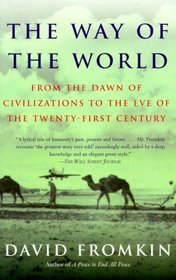Coree B. (Coreegirl) reviewed The Way of the World : From the Dawn of Civilizations to the Eve of the Twenty-first Century (Vintage) on + 216 more book reviews
Western/Americentric but excellent for linking of broad themes throughout history.
From Publishers Weekly
As its subtitle indicates, this is a broad, ambitious work. Boston University historian Fromkin (A Peace to End All Peace) guides readers on a whirlwind journey from the dawn of time to the present, touching on subjects as wide-ranging as Jane Goodall's observations of chimpanzees, Pizarro's conquest of Peru and Thomas Edison's ingenious inventions. The main subject is human civilization: what it is; how it came about; why civilizations rose and fell; what the future of civilization itself may be. Beginning with the city-states of ancient Mesopotamia, humanity gradually transformed from a herd of nomadic hunter-gatherers to an ordered society. The ancients invented agriculture, politics and religion?all while struggling with the ever-present barbarians who threatened to destroy them. Central to Fromkin's story is his account of how Western civilization?although by no means the most "advanced" civilization of its day?managed to conquer and eclipse its rivals and dominate the world to such an extent that "modernization" and "Westernization" have come to be synonymous. The final section, on the future of civilization, sometimes sinks into banalities ("For countries, as for people, becoming too wealthy or too powerful tends to be dangerous"). Of course, any work that combines such brevity with such broad scope is bound to be somewhat superficial. Nevertheless, Fromkin is a skillful raconteur with a keen eye for the telling anecdote and a conquistador's power to cover vast swaths of territory in a short amount of time.
Copyright 1998 Reed Business Information, Inc. --This text refers to the Hardcover edition.
From Publishers Weekly
As its subtitle indicates, this is a broad, ambitious work. Boston University historian Fromkin (A Peace to End All Peace) guides readers on a whirlwind journey from the dawn of time to the present, touching on subjects as wide-ranging as Jane Goodall's observations of chimpanzees, Pizarro's conquest of Peru and Thomas Edison's ingenious inventions. The main subject is human civilization: what it is; how it came about; why civilizations rose and fell; what the future of civilization itself may be. Beginning with the city-states of ancient Mesopotamia, humanity gradually transformed from a herd of nomadic hunter-gatherers to an ordered society. The ancients invented agriculture, politics and religion?all while struggling with the ever-present barbarians who threatened to destroy them. Central to Fromkin's story is his account of how Western civilization?although by no means the most "advanced" civilization of its day?managed to conquer and eclipse its rivals and dominate the world to such an extent that "modernization" and "Westernization" have come to be synonymous. The final section, on the future of civilization, sometimes sinks into banalities ("For countries, as for people, becoming too wealthy or too powerful tends to be dangerous"). Of course, any work that combines such brevity with such broad scope is bound to be somewhat superficial. Nevertheless, Fromkin is a skillful raconteur with a keen eye for the telling anecdote and a conquistador's power to cover vast swaths of territory in a short amount of time.
Copyright 1998 Reed Business Information, Inc. --This text refers to the Hardcover edition.




